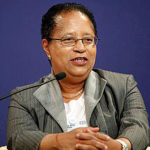By DONNA BRYSON
Associated Press
DENVER (AP) _ The uninitiated might see only the empty, miniature vodka bottles and ghostly plastic shopping bags littering a vacant lot in northeast Denver. Wildlife biologist Stacie Gilmore’s trained eyes scan a pool of drainage water and pick out red-winged blackbirds hiding in the cattails.
Gilmore looks to the future as she surveys the 51/2-acre plot that her nonprofit, Environmental Learning for Kids, plans to open next year as a grassland park and nature center in a low-income, urban neighborhood called Montbello. Her partners include the San Francisco-based Trust for Public Land and state groups like Great Outdoors Colorado that want to connect city dwellers with nature.
Gilmore’s organization, known as ELK, is particularly concerned with serving blacks and Hispanics who many worry are cut off from the opportunities of nature.
Gilmore envisions planting prairie grasses and native trees on the lot, now bookended by a liquor store and car wash. Adrian Benepe, a Trust for Public Land senior vice president, says it’s the kind of place where planners might otherwise have built high-density, high-rise housing for which it was zoned.
Benepe says that thinking is changing. Children need space to exercise. Planners are emphasizing science education, including the kinds of hands-on instruction in biology and botany natural classrooms can offer. Those who want to do something about climate change realize small urban forests store carbon.
The Rocky Mountain Arsenal National Wildlife Refuge, once home to military chemical weapons and agricultural pesticides manufacturing, is just a mile down the road. A chain link fence separates Montbello from the 15,000-acre refuge that was cleaned up under the Superfund program and opened to the public a few years ago.
Gilmore plans to develop the lot and build a gate to the arsenal. She is seeking about $1 million from a pool of $27.4 million created when the U.S. Army and Shell settled a lawsuit filed by the state of Colorado over natural areas damaged by hazardous arsenal activities. Former U.S. Interior Secretary Ken Salazar, who as Colorado’s attorney general from 1999 to 2004 worked to obtain compensation for environmental damage at the arsenal, said using some of that money for Montbello is “fitting and proper.”
Gilmore also is seeking other sources for the prairie-in-the-city project whose total cost she estimates at just over $5 million to secure, restore and develop the plot and ensure an operating budget for at least three years.
The Trust for Public Land bought the plot for $1.13 million in 2012 and is holding it until Gilmore completes fundraising, buys the land and turns it over to the city and county of Denver, at which point ELK will sign a 50-year lease to develop and maintain the site. She has received $350,000 from Great Outdoors Colorado, which administers state lottery proceeds, and $225,000 from the private Gates Family Foundation.
A Latina and the first in her family to earn a four-year degree, Gilmore and her husband, Scott Gilmore, who is African-American and Japanese, have for nearly two decades given minority children a chance to explore and enjoy the natural world. ELK’s activities over the years have included trips to the mountains and plains for thousands of young people.
Dwane Matthews said he had never even touched a fish before Scott Gilmore made him when ELK came to his middle school to talk to kids about fishing. Now 26, Matthews calls his friends at ELK his second family.
Matthews said ELK kept him focused on the future, taking him on college visits as well as camping trips. He is now pursuing a degree in early childhood education at the University of Northern Colorado, juggling classes with a job ELK helped him find coordinating urban rangers and other projects for the National Park Service.
Studies by the Outdoor Foundation, the nonprofit arm of Outdoor Industry Association business group, consistently show that Hispanics and blacks don’t participate in outdoor activities at the rates whites do. That’s worrying to an industry that sells tents and hiking boots as U.S. demographics shift. Experts predict whites will become a minority in the United States by 2043.
Rod Torrez, who grew up in Denver and became a ranger at Grand Canyon National Park, was thrilled to hear about the Montbello project. Torrez this year co-founded a New Mexico-based group called Hecho _ Hispanics Enjoying Camping, Hunting and Outdoors.
“We definitely want to see more urban parks, more wild areas close to urban areas, so people can maintain those connections,” Torrez said.










